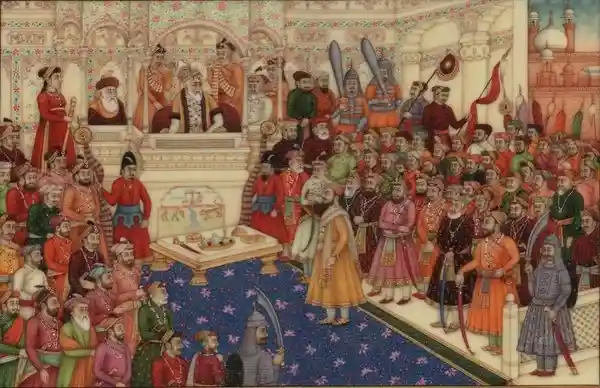Snake and the Mongoose
Two beacons of power came face to face when Shivaji came to Aurangzeb's court. This incident would result in one of the most thrilling escapes of Indian history.

Miniature Painting depicting Shivaji in Aurangzeb's court; Source: Public Domain
A letter had come to the Maratha court. It was an invitation from the emperor of India. An invitation by Aurangzeb that invited Chhatrapati Shivaji to his court at Agra (or maybe Delhi). Doubt filled Shivaji. Something did not sound right about the whole thing. Keeping his intuitions aside, he decided to accept it. The Maratha blood flowed in his veins and by no means could he show that he was afraid of a Muslim ruler!
Shivaji's power was constantly growing which was a threat to the Mughals. It was after Shivaji's defeat against Mirza Raja and the Treaty of Purandar, the dicey invitation came.
It was no small event after all. Celebrations marked the court in Agra and to join in, Shivaji left his home with his eldest son, Sambhaji. A small procession it was, nothing big. Just another visit to the neighbouring kingdom? They reached Agra on 12th May, that day in 1666.
Things moved slowly when Shivaji entered the court. Maybe his heart was pumping fast as if it would come out of his mouth. After all, he was stepping straight into the lion's mouth and the jaw could close any moment. But history does not keep a record of such things. They are left to our imaginations!
Imagine, a long hall in Agra, matted and decorated, on one edge of which sat Aurangzeb. Shivaji must have entered from the other end and walked towards him. He would have then offered gifts to the Badshah, putting them on his feet, offerings from a subordinate ruler. There are records that Aurangzeb said nothing at that moment. The lion was closing his jaw.
Attendants led Shivaji to the back of the court. He was made to stand in the line of mansabdars. It was a trap! The father and son were to become the captives.
This incident can be seen from many perspectives. We can sit and judge Aurangzeb for treating his guests so in a country where Athithi Devo Bhava (Guests are God) or we can judge Shivaji for being foolish enough to walk knowingly into a trap. But history is no place for judgement! History is a fascinating tale of what happened and when. So, we will keep to it.
Angry with how he was being treated, Shivaji stomped out of the court. But he never reached home. He was arrested! Maybe Aurangzeb never planned this but was pissed off at Shivaji's behaviour.
The day came to an end. Many months came to an end. Shivaji remained captive. Not in a dingy cell. In a haveli.
He was a king even in prison with a guard of servants around him the whole time. Eventually, he made friends with the postmaster and many others to gather the information that could be used to plan an escape. There were constant debates in Aurangzeb's court on whether to kill Shivaji or employ him. The emperor, however, wanted to use the king's skills in Kandahar.
Tricking Aurangzeb, he feigned illness and requested the emperor to at least let go of his men. The wish of the sick-man was granted. Time was right when Aurangzeb got busy with the uprisings in the northwest and had to leave the capital for the same.
There are many legends of his escape. In the absence of the emperor, a celebration was held in Shivaji's prison-haveli for Pandit Kavindra Parmananda. He dressed as a fakir while his associate Niraji Raoji dressed as Shivaji. In the commotion of celebration, the fakir king escaped the prison! Some say, he smuggled himself and his son in fruit baskets that came for the ceremony.
Legend also has it that Zeb-un-Nissa, Aurangzeb's favourite daughter herself, hid Shivaji in the basket of fruits to help him escape.
When Aurangzeb, the emperor himself couldn't find out the truth, who are we, the common men trying to reconstruct history three centuries later? The fascinating thing is he escaped. The Chhatrapati, in the end, had outwitted the wittiest Emperor in the subcontinent.


